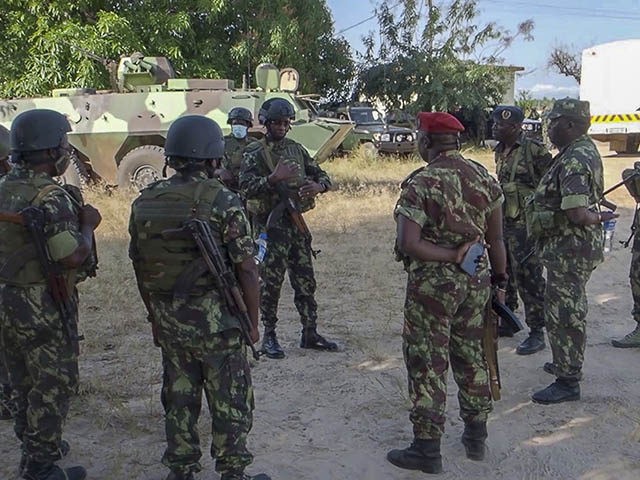Mozambican President Filipe Nyusi on Monday paid a visit to the turbulent northern province of Cabo Delgado to introduce the Southern African Development Community (SADC) Standby Force, a unit including troops from several southern African nations deployed against the Islamic State jihadis wreaking havoc in Mozambique for years.
Nyusi rolled out the SADC force a day after Rwandan troops helped Mozambique recapture the vital port city of Mocimboa de Praia, which the jihadis began attacking in 2017 and decisively captured in the Summer of 2020.
The Mozambican president said he was “satisfied” with recent progress against the insurgency and thanked “our brothers from Rwanda” for their assistance.
“The control of the town of Mocímboa da Praia and the gradual return of circulation between Palma and Mocímboa da Praia is the product of the bravery and delivery of the joint force, to quickly return stability to the region,” he said.
The insurgency, locally referred to as “al-Shabab” but with no relationship to the Somali terrorist organization of the same name, used its control of Mocimboa de Praia to disrupt the foreign-developed oil, gas, and mineral industries, further impoverishing Mozambique and creating more recruits for itself.
The Islamic State also paralyzed local agriculture, creating a massive humanitarian crisis. Experts have accused the southern African wing of ISIS of the brutal murder of civilians, including beheadings on the street in broad daylight.
Nyusi has long been reluctant to invite troops from neighboring countries to fight the jihadis, but last month 1,000 Rwandan soldiers began deploying in the northern Cabo Delgado province. Nyusi declared the insurgency was “retreating” from its position soon after the Rwandans arrived.
Last week, the Rwandans took the small town of Awasse from al-Shabab and, on Sunday, the Rwandan Defense Forces announced the recapture of Mocimboa de Praia, “a major stronghold of the insurgency for more than two years.”
Rwandan spokesman Col. Ronald Rwinga said on Sunday that joint “stabilization operations” around Mocimboa de Praia would continue to “pacify” the area and allow displaced Mozambicans to return home and restart their businesses. Over 800,000 civilians have been displaced by the fighting.
Rwinga described Mocimboa de Praia as “the last stronghold of the insurgents” and said its capture marks “the end of the first phase of counter-insurgency operations.”
Mozambican military officials told local media the insurgency pulled about a hundred of its fighters out of Mocimboa de Praia without serious resistance against the vastly superior joint force, with the likely goal of reorganizing in small hidden pockets and conducting guerrilla warfare.
During a visit to Cabo Delgado’s provincial capital of Pemba on Monday, President Nyusi welcomed the SADC force, which initially includes combat troops and armored vehicles from Botswana, training officers from Zimbabwe, air force personnel from Angola, and about $400,000 in funding from Namibia. Lesotho, Tanzania, and South Africa are also participating, the latter pledging to contribute nearly 1,500 troops plus ships and aircraft.
Botswana was the first nation after Rwanda to put boots on the Mozambican ground and was a major driver behind the multinational security commitment, fearing the instability in Cabo Delgado could spread across the region. South Africa also expressed concerns about the deteriorating situation and called for an SADC military intervention.
SADC representatives in Cabo Delgado said the total force will ultimately comprise about 3,000 troops. This would be in addition to the soldiers from Rwanda, which is not one of the SADC’s 16 member nations.
Force commander Maj. Gen. Xolani Mankayi of South Africa said Monday his mission is to “facilitate the creation of a secure environment, to ensure that the state authority is in full control of the Cabo Delgado affected areas, and normal lives can resume.”
Nyusi also accepted help from the European Union, which announced in July that it would dispatch a military training mission to reinforce an existing training program established by Portugal, the former colonial ruler of Mozambique. Portugal offered to provide half the manpower for the two-year EU mission, which will boost the number of European trainers in Mozambique from 60 to two or three hundred.
The Associated Press (AP) on Tuesday noted that al-Shabab was able to force French energy company Total to withdraw from a $20 billion natural gas project on the Indian Ocean coast this year. According to Mozambican media, France is a major financial backer for the Rwandan military expedition.
The BBC noted over the weekend that Rwanda’s thousand-strong force has accomplished in two weeks what the Mozambican military could not do in two years.
“Mozambique’s defence forces are widely regarded as corrupt, poorly trained and ill-equipped and were no match for a growing but still rag-tag band of insurgents,” the BBC said.
Nyusi’s reluctance to accept outside help was a concession to harsh realities of the Mozambican political scene, where the nations most willing and able to help — Portugal and South Africa — are not regarded fondly. Nyusi’s administration feared intervention from historically disliked foreign countries might strengthen the insurgency.
On the other hand, the U.S., EU, and other major powers were somewhat reluctant to help Nyusi’s government crush an insurgency filled with angry starving people who had grievances against the exploitation of Mozambique’s national wealth, along with their often brutal treatment at the hands of government troops and private security contractors.
As the BBC put it, the first problem was solved with the “compromise” guardian angel of Rwanda, which has both an effective military and little bad blood among Mozambicans.
The latter was addressed by emphasizing al-Shabab’s real, but nebulous, ties with the Islamic State. The U.S. State Department prefers the designation “ISIS-Mozambique” for the insurgency and classified it as a foreign terrorist organization under that name in March 2021.

COMMENTS
Please let us know if you're having issues with commenting.